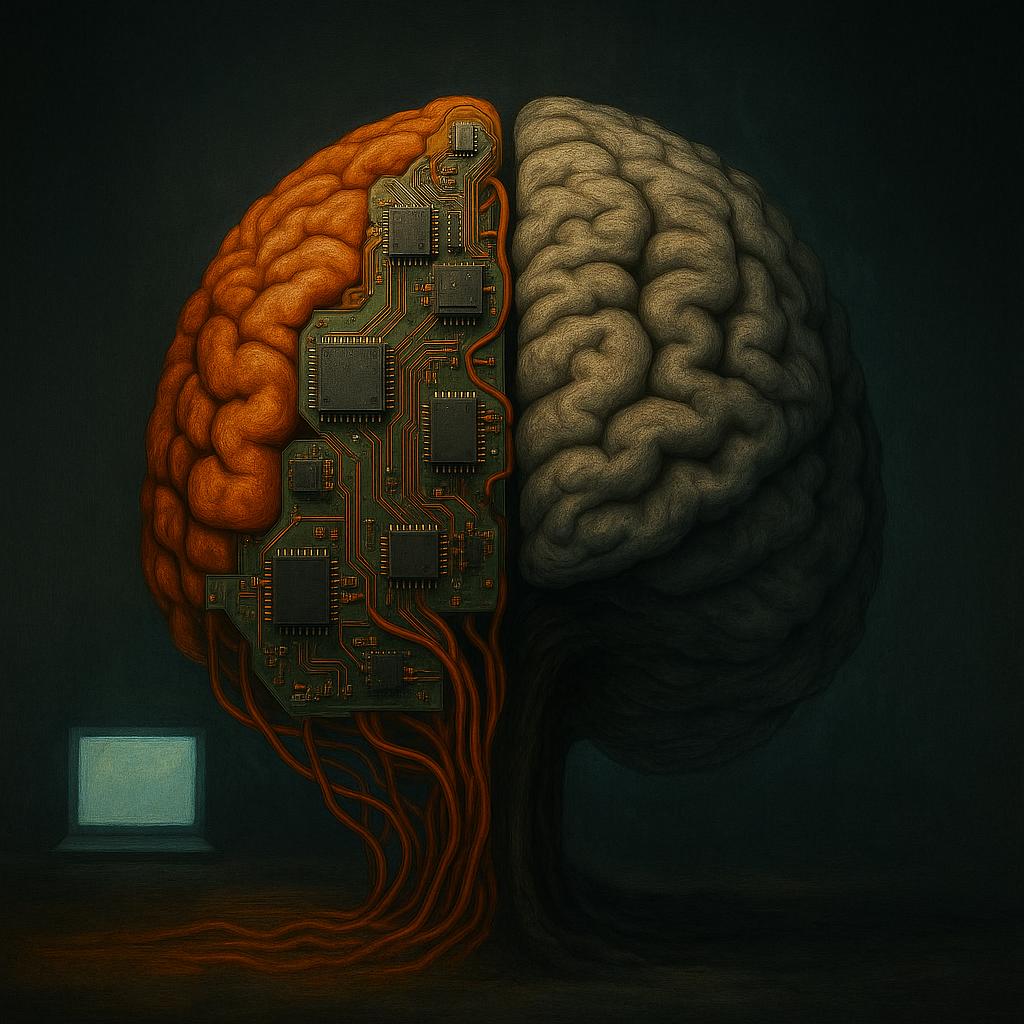The rapid rise of AI in daily life has sparked a debate over its impact on human intelligence.
Many wonder if easy access to smart tools dulls mental sharpness and causes people to rely on machines rather than their own skills. Others argue that AI frees up brainpower and allows deeper, more creative thinking. This ongoing process raises questions about our habits, learning, and decision-making.
As technology continues to integrate itself into more areas of life, examining exactly how AI changes the way people think and learn has become more important than ever. The answer is not straightforward and deserves a closer look.
How AI Could Make Us “More Stupid”
AI makes many daily tasks easier, but some experts argue that this convenience can have a downside.
When people get used to AI performing most of the effort, certain thinking habits may slip. Users may skip steps they once did themselves, like double-checking information or working out basic math problems.
This shift can cause a quiet erosion of skills that used to be second nature.
1. Overreliance on Automation
Turning to AI for every task can quickly lead to overreliance. People accept AI suggestions without much thought, assuming that the machine knows best.
In some workplaces, automated systems decide everything from scheduling to what news people see. This hands-off approach saves time but can reduce a person’s ability to make independent judgments.
Reliance on GPS, for example, has left many struggling to navigate without digital help. In writing, AI autocomplete tools finish sentences, so users may start losing command of grammar or spelling.
Examples of overreliance:
| Task | Human Skill Fading | AI Tool Replacing It |
|---|---|---|
| Navigation | Map reading, sense of direction | GPS, navigation apps |
| Writing | Grammar, vocabulary | Autocomplete, spellcheckers |
| Math | Mental calculation | Calculators, AI math solvers |
| Research | Information vetting | Search engines, AI answers |
2. Erosion of Critical Thinking
Critical thinking suffers when people trust AI output without verification. Algorithms are fast, but not always accurate or unbiased.
When users stop questioning answers, asking follow-up questions, or considering alternative solutions, thinking patterns can become passive.
False confidence in AI can lead to misunderstanding complex issues or missing crucial details.
AI tools curate information to match user habits and lead to echo chambers instead of broad perspectives.
It’s not uncommon for individuals to share misinformation simply because an AI platform suggested it, without double-checking the facts themselves.
3. Loss of Skill Practice
Skills that aren’t used regularly can weaken over time. AI automates routine activities like calculations, writing drafts, and looking up information, leaving fewer chances for hands-on practice.
As tasks become more automated, people have less reason to stay sharp in those areas.
This can lead to a gradual decline in abilities that once required effort and repetition to master. For example, frequent use of translation tools may cause language learners to stall in their progress, while artists using AI image generators may not practice hand-drawing as often.
If these skills are neglected, regaining proficiency can take time and conscious effort.
How AI Could Make Us Smarter
There’s another side to the story: AI has the potential to strengthen thinking, problem-solving, and learning when used thoughtfully. With smart integration, AI becomes a partner that expands capability.
Instead of replacing human strengths, it can act as a catalyst and help people tackle tougher challenges.
1. Cognitive Offloading for Higher-Level Thinking
Cognitive offloading means shifting routine mental tasks to technology so people can focus on more complex work.
By letting AI handle repetitive duties like calculations, scheduling, and sorting information, mental bandwidth is freed for creativity and analysis. Scientists, engineers, writers, and students all benefit when they use AI to lighten their workload.
For example:
| Task Handed to AI | Higher-Level Work Enabled |
|---|---|
| Sorting large datasets | Analyzing trends |
| Spelling and grammar checks | Crafting compelling arguments |
| Managing calendars | Planning strategic projects |
| Automating math | Developing innovative solutions |
People can use the time saved to break down complex concepts, brainstorm solutions, and ask more meaningful questions.
2. Access to Knowledge at Scale
AI puts a massive reservoir of information within reach.
It can sift through thousands of articles, reports, and studies in seconds, bringing relevant data directly to users. With smarter search, people quickly compare viewpoints, gather multiple sources, and clarify confusing topics.
This “knowledge at your fingertips” effect helps learners understand concepts quickly and makes updated information easy to find.
In this sense, AI removes some barriers to learning and empowers people to reach further than before.
Benefits of AI-powered knowledge include:
- Immediate summaries of complex topics
- Quick identification of trends or patterns
- Access to global perspectives
- Easier translation across languages
When time and effort to locate trusted information are reduced, more energy goes into understanding and applying what’s learned.
3. Enhanced Collaboration Between Human and Machine
Collaboration between humans and AI can bring out the strengths of both.
- People contribute empathy, ethics, creativity, and context.
- Machines deliver speed, pattern recognition, and recall.
When combined, these capabilities create results that neither alone could achieve.
In schools and workplaces, AI assists with brainstorming, idea generation, and project planning.
In medicine, it analyzes large patient data sets to suggest treatment possibilities while doctors decide the best course with their expertise and understanding of patient needs.
Artists and designers are experimenting with AI-generated art as inspiration or as part of the creative process.
Used intentionally, AI amplifies human strengths and opens doors for new kinds of thinking, discovery, and achievement.
The “Use It or Lose It” Principle
Regular exercise keeps skills sharp, but if people stop using them, they fade.
AI takes over routine mental work, so real-life practice drops.
This effect is visible in both school and work settings. Tasks once completed by hand, like remembering phone numbers or writing first drafts, now happen through AI shortcuts.
Without conscious effort to maintain these abilities, natural proficiency slips away.
To preserve important skills, building in consistent practice is essential. Some ways to stay proficient are:
- Setting aside time for manual calculations
- Reading without digital aids
- Writing without spellcheck
The Real Question: Who’s in Control?
Who benefits most from AI comes down to who actively directs its use. When people decide what tasks to automate and when to step in themselves, they retain control over their own learning.
Letting AI run on autopilot can result in skills diminishing, but using it as a deliberate helper makes users remain involved and think critically.
Instead of suggestions or shortcuts guiding every action, individuals can pause, check, and adjust results as needed.
Setting personal boundaries with technology (like turning off autocomplete or fact-checking AI-supplied information) helps keep core skills strong. The key is making choices, not just following recommendations.
Final Thoughts
AI’s effect on intelligence depends on how people interact with it. Used thoughtfully, it becomes a helpful tool for expanding understanding and productivity.
Left unmanaged, it can chip away at abilities that once came naturally. Individuals must choose when to use AI and when to rely on their own judgment and skills.
Staying aware of habits helps balance technology’s benefits with the need to maintain personal competence.
The outcome is shaped by active decisions, not automation alone. Responsibility is squarely in the user’s hands.



